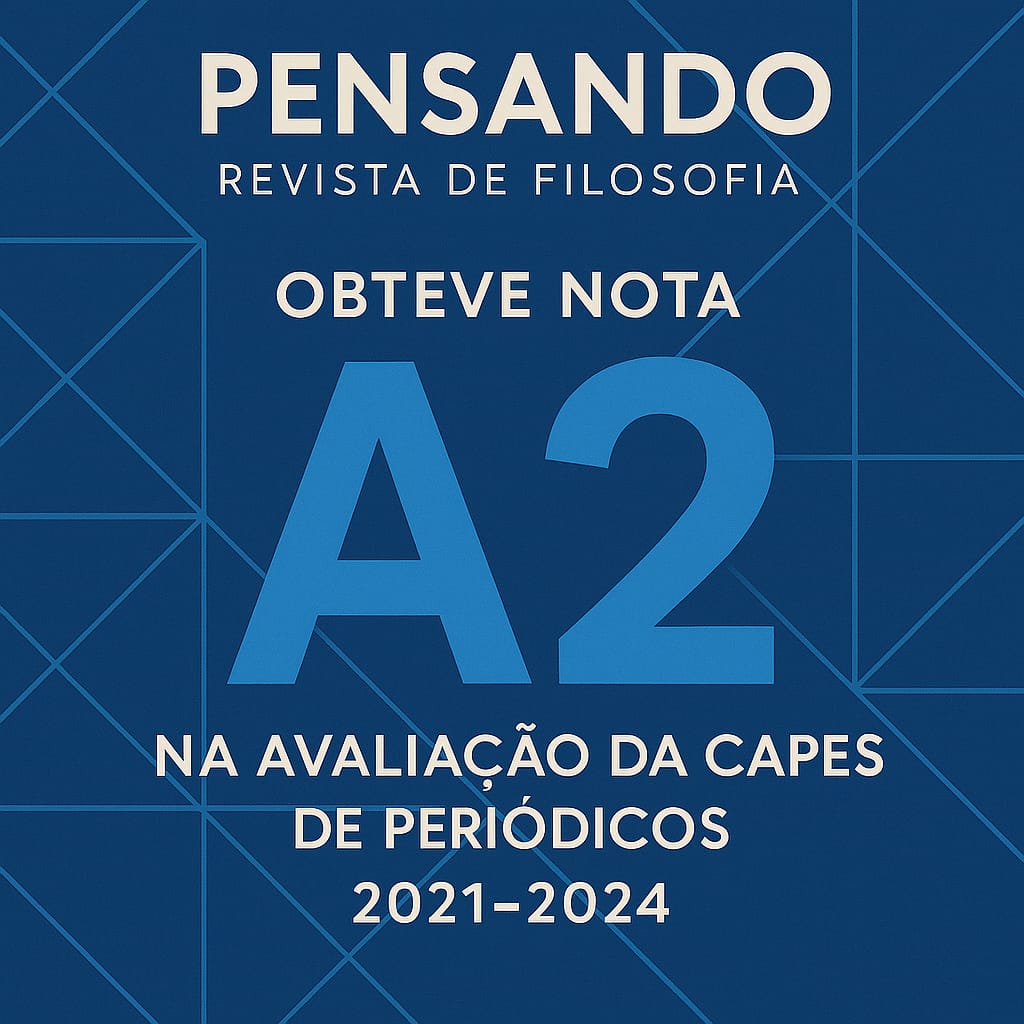Páthos e disposições fundamentais
As Tonalidades Afetivas na Fenomenologia de Heidegger
DOI:
https://doi.org/10.26694/pensando.vol16i37.5768Palavras-chave:
Tonalidades afetivas, Páthos, Heidegger, AristótelesResumo
O presente artigo propõe uma análise fenomenológica das tonalidades afetivas no pensamento de Martin Heidegger. Em oposição à abordagem tradicional das ciências ônticas, a fenomenologia heideggeriana investiga a relação entre os afetos e o Dasein como condição essencial para a experiência de mundo, explorando a maneira pela qual o Dasein se revela em sua manifestação imediata, ontologicamente disponível ao estar-afetado. Para acessar o significado de Stimmung em Heidegger, o estudo rastreia a origem do termo grego páthos em Aristóteles e a apropriação feita por Heidegger em suas preleções de 1924, culminando na analítica existencial desenvolvida em Ser e Tempo. Em seguida, o artigo explora como a temática dos afetos foi reorientada na virada de Heidegger, especialmente em sua radicalização da história do ser, conforme exposto nas preleções de 1929 e em Contribuições à Filosofia:do Acontecimento Apropriador. Conclui-se que Heidegger, a partir de sua leitura de Aristóteles, reconheceu o páthos como base de sua hermenêutica, vendo-o como o solo originário do logos, que dinamiza o Dasein em sua existência histórica e mundana. Em sua fase tardia, Heidegger reorientou a analítica dos afetos, compreendo que estar disponível aos afetos é um encontro fundamental com o seer, que alterna entre retraimento e doação. No âmbito do pensamento onto-historial, Heidegger trouxe discussão do estar-afetado para um campo mais originário, analisando a estrutura da atmosfera existencial em que o seer é historicamente afinado por uma tonalidade afetiva fundamental (como o tédio profundo que caracteriza a era da maquinação) e aberto como horizonte de manifestabilidade dos entes na totalidade.
Referências
ARISTÓTELES. Da Alma. Livros I-III. Tradução de Lucas Angioni. Coleção textos didáticos, n.38. Campinas: IFCH/Unicamp, 1999.
ARISTÓTELES. Ética a Nicômaco. Tradução de e notas de Mário da Gama Kury. Brasília: Universidade de Brasília (UNB), 1985.
ARISTÓTELES. Física. Traducción y notas Guilermo R. de Echandia. Madrid: Editorial Gredos, 1995.
ARISTÓTELES. Metafisica. Volume I, II e III. Ensaio introdutório, tradução do texto grego, sumário e comentários de Giovanni Reale. Tradução de Marcelo Perine. São Paulo: Loyola, 2002.
ARISTÓTELES. Retórica das Paixões. Livro II da Retórica. Prefácio de Michael Meyers. Tradução de Isis Borges B. da Fonseca. São Paulo: Martins Fontes, 2000.
BONITZ, Hermann. Index Aristotelicus [1870]. Darmstadt: Wissenschaftliche Buchgesellschaft, p. 555-557, 1955.
CASANOVA, Marco. Tédio e Tempo. Rio de Janeiro: Via Verita, 2021.
COSTA, Judenice. O conceito e a caracterização de páthos na Retórica de Aristóteles. Dissertação (Mestrado em Filosofia). 159 f. Universidade Federal de Minas Gerais, 2015.
GROSS, Daniel M. Introduction: Being-Moved: The Páthos of Heidegger’s Rhetorical Ontology. In: GROSS, Daniel M. & KEMMAN, Ansgar (Eds.). Heidegger e Rhetoric. New York: State University Press, p. 01-47, 2005.
HEIDEGGER, M. Sein und Zeit (GA 2). Friedrich Wilhelm von Herrmann (Ed.). Frankfurt am Main: Vittorio Klostermann, 1977.
HEIDEGGER, Martin. Basic Concepts of Aristotelian Philosophy. Translated by Robert Metcalft Mark Tanzer. Bloomington: Indiana University Press, 2009.
HEIDEGGER, Martin. Beiträge zur Philosophie (Vom Ereignis). (GA 65). Friedrich Wilhelm von Herrmann (Ed.). Frankfurt am Main: Vittorio Klostermann, 2003.
HEIDEGGER, Martin. Die Grundbegriffe der Metaphysik. Welt – Endlichkeit – Einsamkeit (Winter semester 1929/30). (GA 29-30). Friedrich Wilhelm von Herrmann (Ed.). Frankfurt am Main: Vittorio Klostermann, 1983.
HEIDEGGER, Martin. Grundbegriffe der aristotelischen Philosophie (Summer semester 1924). (GA 18). Mark Michalski (Ed.). Frankfurt am Main: Vittorio Klostermann, 2002.
HEIDEGGER, Martin. Os conceitos fundamemtais da metafísica – Mundo – Finitude – Solidão. Tradução de Marco Casanova. 2ª Edição. Rio de Janeiro: Forense Universitária, 2011.
HEIDEGGER, Martin. Ser e Tempo. Tradução revisada de M. S. Cavalcante. 4 ed. Petrópolis: Vozes, 2009.
HEIDEGGER, Martin. Contribuições à Filosofia: do acontecimento apropriador. Tradução de Marco Casanova. Rio de Janeiro: Via Verita, 2015.
INWOOD, Michael. Dicionário Heidegger. Tradução de Luísa Buarque de Holanda. Rio de Janeiro: Jorge Zahar Ed, 2002.
LOPES, Marcelo. Sobre la distinción entre Stimmung y sentimientos existenciales: la relevancia de los casos psiquiátricos. Topicos del Seminario, v. 1, p. 35-52, 2023.
MADRID MENESES, Raúl. Del páthos a la befindlichkeit: Recepción y apropiación de los Páthe aristotélicos en la analítica existencial del Dasein. Byzantion nea hellás, Santiago, n. 34, p. 19-45, 2015.
MEYERS, Michael. Prefácio: Aristóteles ou a retórica das paixões. In: ARISTÓTELES. Retórica das Paixões. Livro II da Retórica. Tradução de Isis Borges B. da Fonseca. São Paulo: Martins Fontes, 2000.
OELE, Marjolein. Heidegger ’s Reading of Aristotle’s Concept of Páthos. Philosophy, n. 18, p. 01-26. 2012. Disponível em: http://repository.usfca.edu/phil/18. Acessado em 26 de fevereiro de 2024.
PÖGGELER, Otto. A Via do pensamento de Heidegger. Tradução J. T. de Menezes. São Paulo: Instituto Piaget, 2001.
POGGËLER, Otto. Heidegger’s Restricted Conception of Rhetoric. In: GROSS, Daniel M. & KEMMAN, Ansgar (Eds.). Heidegger e Rhetoric. New York: State University Press, p. 161-177, 2005.
Publicado
Como Citar
Edição
Seção
Licença
Copyright (c) 2025 PENSANDO - REVISTA DE FILOSOFIA

Este trabalho está licenciado sob uma licença Creative Commons Attribution 4.0 International License.

























